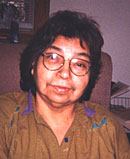
Commentary: Nancy Harles
April 2000
| |
|
|
|
||
TODAY IT APPEARS that "talking circles" are popping up all over the place. In light of this increased use of the Circle some serious questions arise. Is the Circle loosing its true value and meaning? Are these circles being viewed in the same light as the traditional Circle? Can the Circle be adapted to meet the needs of modern society without being changed beyond recognition?
The origin of the Circle lies in the culture of the first people of this country: the American Indian. For Indian people, the Circle is very powerful and held with great honor. It is a ceremony done with great respect and ritual. It is a means of settling disputes, making decisions, and making amends with the help of the Great Spirit.
In the Indian culture, only people knowledgeable of the culture and ways of the people are allowed to conduct the traditional Circles. Native spirituality is a big part of the Circle process. In the modern justice circle - used as an alternative to the criminal justice system - the leaders attend a few training sessions and they are ready to go. I doubt if much of the true meaning and value of the traditional Circle can be learned in that short period of time.
The Justice Circles held at the St Cloud Area American Indian Center have been in operation for a year and a half. They were created in collaboration with the county court system. It is viewed by some people as an alternative to jail time for minor offenses.
Spirituality is not always an important component to the modern justice circle. Anyone can join the justice circle. As a result, a variety of people come and go to the circle. Some come looking for something mystical or magic. Others look for a higher power. Some seek guidance for themselves. Still some come out of curiosity. Most of these people are here for a short time and are gone.
But there are good-hearted people who come week after week. They bring their own spirituality to the Circle, which differs greatly from native spirituality. It is not our ways to impose our spirituality on anyone. The participants are respectful of our ceremony and take part in it. It may be up to those participating to decide whether a modern justice circle requires spirituality or is just a vehicle to resolve modern day problems.
If it takes justice circle to get people talking and helping one another, then by all means use it, but don't imply it is something it is not. Don't demean our sacred ceremony.

